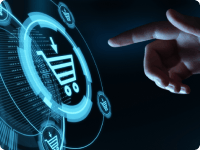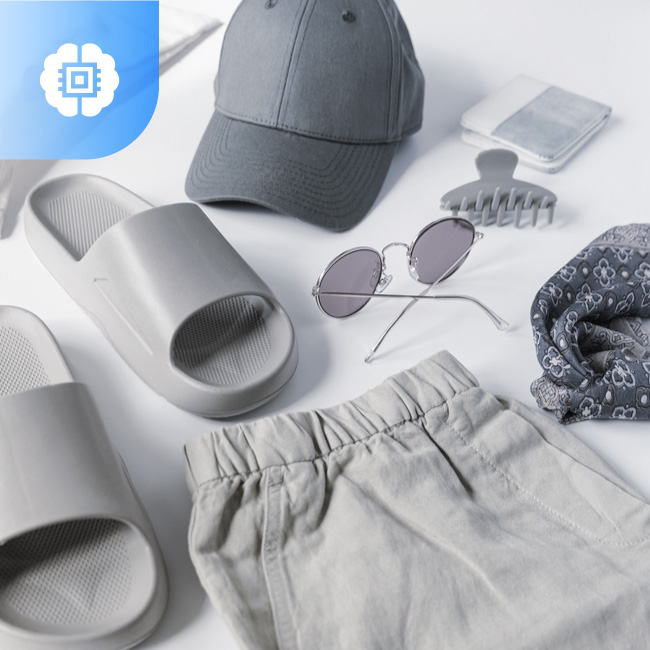
Modelled around changing times – The Jolovies Story
About this Podcast:
In the last ten years, the business of retail has changed more than at any other time in history. This change has been good for some and not so great for others. In this episode, we’re talking to someone who is not only weathering the change but also thriving in it. Today we’re exploring the world of Jolovies, a modern fashion apparel brand based out of Greece.
Joining us on our latest episode of the Retail Podcast by Vue.ai is Alex Evangelou, Co-founder of Jolovies.
Episode Transcript:
Hello. Welcome to a brand new episode of the Retail Podcast by Vue.ai. I'm Krithika Anand, your host. The Retail Podcast by Vue.ai focuses on conversations around technology, AI, and all things retail. In the last ten years, the business of retail has changed more than at any other time in history. This change has been good for some and not so great for others. In this episode, we're talking to someone who is not only weathering the change but also thriving in it. Today we're exploring the world of Jolovies, a modern fashion apparel brand based out of Greece. Before we dive in, we have with us today, Alex, one of the founders of Jolovies, he's going to take us through their journey with their brand, the hardships and the adversity that they've overcome. Hi, Alex. Welcome, and it's so lovely to have you on our podcast.
Alex EvangelouHello, Krithika. Thank you very much for asking me to join.
Krithika AnandIt's our pleasure, Alex. Great. So let's jump right in. So why don't we begin by you telling us a little bit about Jolovies journey, the inspiration behind it, and where you stand in the world of fashion in Greece today?
Alex EvangelouSure. So Jolovies’ idea originated from my wife. She is a fashion lover and a fashion addict. I'll put it mildly. And it was the initial goal actually to start it in 2017. But because we had our first child and some other priorities, it was delayed and postponed basically until 2021. So in general, it was her friends who always asked her opinion on shopping, what clothes to buy and whether this particular garment fits with that garment or the other. So she was the one that was always being asked these types of questions. She's always kept up to date with the latest fashion trends. She loves spending hours going for shopping. And we decided to to to start something together. I help her with the technology part. She does her own bit on the selection of garments and customizations of the clothes that she prefers. And that's how Jolovies was born in 2021.
Krithika AnandWow. That's incredible. I'm sure it must have been quite a journey and it's really nice to hear the stories straight from you. All right. I'm curious to understand, Alex, do you believe with what's going on, businesses today continue to be affected deeply by the overall geopolitical situation and the climate of the region and the volatile market conditions across the globe. Right. What are the changes in consumption patterns that you are noticing and how is it affecting business either globally or in Greece in specific?
Alex EvangelouSo I think what was happening in Greece was the same as it was happening throughout the world during these past 12 months. It was initially the pandemic, the COVID pandemic, and then the war in Ukraine, which is closer feels closer here than maybe in other regions, definitely closer since we are in Europe. So what we were seeing, for example, during the pandemic is that everyone was jumping in to open their e-commerce store. Many people were doing this thing for the first time. They didn't have a lot of experience. And although I am an IT professional myself, we did need some IT technical support for some parts of our website and some parts of the software that we needed. And because everyone was so overloaded with work, it was difficult for them to to to book a slot for us. And so everything was delayed for several weeks. One feature of the website, one part of the software customization to integrate with their receipts. For example, all these bits and pieces were being delayed because of the COVID pandemic. Shipments were also being delayed from China because China had an even more severe type of lockdown than done in Europe. So there were several delays in freight as well. Now, after that, we have the situation, of course, that's happening in Ukraine. And since February, one of the things that we noticed is that website visits decreased and ad spend on social media and search engines did not have the same effect on conversion as it used to have before the war so it kind of caused a significant downturn in purchasing patterns. I would call it a significant decrease in conversions. And many people were sceptical of where are we going to, where are they going to spend their money? Was it wise to spend it now or maybe keep it because you don't know what's going to happen? And so that that was a major change that we saw, especially the ads where the conversion was very low. And many other eCommerce stores that we know of stopped or decreased their ad spend by a lot. And we did the same during this time. So that was the most important thing before after the war, after February of this year. The second thing is that we saw a lot of cost increases. We received urgent emails from the courier companies telling us that since June, we will start increasing the freight costs by 12% for each package. Even though we had annual agreements with them, they took advantage of some clauses in the agreement that said for urgent events we can increase the prices. So they did. Increase those prices. We saw increases in all types of bills here from electricity bills, etc.. So there were several cost increases as well. So, yes, there has been a significant geopolitical. Shift. Major changes that the past 12 months and I would summarize it that that way as I mentioned, I hope I didn't miss anything, but I think these are the most important points to mention. So of course, the goal is to overcome adversity and manage to survive and thrive. This is very important for us as well since the startup was started in 2021 and it would be really sad to see it disappear very soon. So we're trying to overcome adversity and thrive as soon as possible. Some of the things that we considered and have actually applied is, of course, cost-cutting measures. We're trying to do all we can to decrease the utility bills, to decrease ad spending. For example, we saw that after the war started in February. In Ukraine, the ad spending effects and conversions were much lower, as I had mentioned previously. So we reduced our spending, but we increased search engine optimization actions and we're seeing some effect on that. Another thing we did is that because of the huge freight delays and huge freight costs from China, we started working with, or at least we are in the discussion phases with some EU suppliers and we have the advantage that in the EU we can ship by truck, which is significantly faster and much cheaper than shipping from China. And another obvious thing is the financial aspect of it is that, for example, you can build a good relationship with your suppliers and partners and agree on some maybe a little lower cost or longer payment terms. So you can manage this period of adversity. And of course, as I said, three later on. So this was a brief on the actions that we took to overcome adversity.
Krithika AnandRight. Right. Absolutely. And I think it's quite evident that the last couple of months might have not been very easy for you and, you know, for almost all the brands spread across the geo, right?
Alex EvangelouYes, sure. I agree with that. Definitely. I think that's the case.
Krithika AnandYeah. You know, we're somewhat happy to hear that is steadily rising about in the face of this adversity. And we wish you the very best.
Alex EvangelouThank you very much. I think we will survive. The idea for us is that we're now trying to survive and after the survival, thrive hopefully very soon after that. But at this point in time, we're trying to survive and make this startup manage to achieve its goals and be profitable and give the best service to customers.
Krithika AnandAbsolutely. And we truly hope that things get better over time for you.
Alex EvangelouThank you. Thank you very much.
Krithika AnandAll right, then. I also wanted to quickly touch upon the need to go digital when a situation like this arises right during the pandemic. One way out for retailers was to go digital, and there's been a tremendous increase in the desire and the need to go digital and sell online. And it's almost very important that brands move towards a very cohesive digital experience for customers. But most e-commerce retailers today are not fully equipped with either the knowledge or the content that's needed to establish their presence in their own right. And in these difficult times, can you tell us how technology will help in overcoming these challenges and enable brands to adapt to the constantly evolving retail landscape?
Alex EvangelouSure. I think that is digital now. Yeah, sure. I think, of course, technology and digital adoption is everywhere around us. And it's, of course, more prevalent during and after the pandemic because, of course, retail shops were not able to sell directly in brick and mortar stores directly to customers. So they had to adopt and open their ecommerce stores. There are several issues that we saw there. As I mentioned earlier, for example, there were significant delays in any task that we needed to help with. There were significant delays because there were so many people that so many businesses and individuals were going and asking for assistance from these companies. And so they were overloaded with work. I also believe that all these companies have made new hires and some of these new hires might not have been as experienced as the existing employees in the company. So there will be some migratory stage, let's say, to these companies that they will need to train these new employees and be able to handle the increased flow of tasks being required for the job, for their jobs from businesses and individuals that need it to help issues from anything from ecommerce websites to ERP systems for printing their receipts, etc. I think digital transformation is everywhere. And for us, for example, apart from the e-commerce store, there are several initiatives in Greece and other countries. For example, in Greece, we are able to now legally send digital receipts and we know we no longer need to physically print the receipt and include it in the package. It's legal to email it to the customer. So we also have some environmental benefits there as well and some efficiencies being added to the process of picking, packing and shipping orders. There are also advantages. For example, personalization on websites when there are so many AI personalization services available and some top offers, for example, from Vue.ai itself, where you can observe the user, their purchasing patterns, the products they view, and you can personalize what they see, the email marketing that they receive. And this is good for the user as well, because they are seeing what they need most. And it's also good from an ROI perspective because there's higher targeting and better return on investment. Also, for example, of course, Vue.ai has a virtual models service which we are using as Jolovies, and it's a great service because during the COVID pandemic it was difficult and very expensive to hire models and photoshoot the products on the models. And these services helped us a lot during those months and we are continuing to use it of course today. So yeah, in general, this is what I have to mention about how technology can help in the retail sector, basically everywhere. You cannot really exist as a retail business without being digital as well, especially after the COVID pandemic, because everyone has a fear that if there is another one, another wave of mutations of these variants of this virus and we have to be locked down again, how are we going to continue selling? So have the majority, I think have made the switch and they are digital as well. Now digital can be all-encompassing and can be in any part of the business. So there are many parts where digital migration is important for us. For example, it has been. Of course, the e-commerce website, the digital communication with customers, not just by phone call, but also with a digital chat through the website, through social media chat. So the communication is primarily there. Customers have become familiar with that and it's convenient and it's it makes sense for them. They don't necessarily want to talk over the phone all the time. The receipt issuing is no longer needed to be on paper. There are digital receipts and legal digital receipts that can be sent to the client by email. There is no need to print them out. There is, of course, digital marketing. So advertising is, as we all know, no longer just TV and radio it is a lot now on social media and search engines and especially for an ecommerce store. That makes a lot of sense because it can be customized and you can see and track what is the ROI on the ad spend per product, per SKU level down to each color and even the size of a garment. So you can track all these data with digital marketing.
Krithika AnandOh, wow. Right. Thank you so much for this, Alex. You know, I came across the statement and it is always stayed with me, right? It goes digital is like gravity and it is everywhere in our lives and it is true. Right. And you rightly pointed out that digital is now everywhere around us. The statement stands out for me from what you just said. And the advancement of technology truly has been reflected in the way retailers interact with customers today. And since you already touched upon this, I'm going to actually ask you a question about the importance of AI in today's retail landscape. We're seeing a lot more ecommerce retailers today have slowly adapted to integrating AI models and taking a sidestep from traditional model shoots. So how do you for e-commerce, retailers today have slowly adapted to integrating models and taking a sidestep from traditional models right? How do you think or how do you shift and reshape the future of retail?
Alex EvangelouWe think it's a major change and it's something definitely very good for everyone. For example, of course, during the pandemic, it was a must-have because it was difficult to work with models and book meetings and do photo shooting, etc., and also very expensive. So for us, it was really the kind of the only option at that point in time. But after utilizing it, we found that it's a viable alternative. And our opinion now is that it is something that's going to continue. And we believe it will be a hybrid approach of actual models with virtual models because. Everyone has its advantages and disadvantages. For example. But for a business that is maybe. Along a further way in their journey to and they've scaled significantly they have many garments per week. They might choose that part of their SKUs will be on virtual models and part will be on real models just to speed up the process. Some might choose to have everything in virtual models and have parts of the photoshoots on real models, for example. But it needs to be on the C next to the beach swimming, for example, or it needs to be in an environment that is difficult for a virtual model. They will choose the actual model. If they need a video with specific effects, they might choose a real model. But for all the other circumstances, I think the virtual model is a very good approach. So we consider this to be very. Important for speed efficiencies, for variation of models, for example, in one country might be difficult to find all types of people Asian, African, Latin American. All these all the types of people. And it might be difficult to hire such people so that is a solution with virtual models. Of course, as I mentioned, the efficiencies there are huge compared to hiring actual models. But it is a big learning curve. There is a lot of work to be done on the studio, on appropriate lighting, appropriate backgrounds, camera settings, the appropriate lenses, colours, mannequins, etc. But we think that it is something that is really worth it. And there will be a hybrid approach from now on in the future that it has reached this stage in AI technologies.
Krithika AnandYeah, yeah. That's really interesting to know, Alex. And absolutely right. The future of retail is shaped heavily by AI and we're happy to be able to influence that to really be part of this change. I think, you know, we've covered quite a few different areas that we wanted to talk about. But before we get to the end of the podcast, it goes without saying that we are absolutely ecstatic about the incredible relationship that we share with you. And so why don't you tell us a bit about how the association has been for you so far?
Alex EvangelouIn general, we are really happy with our partnership with Vue.ai. You have a really incredible team, really knowledgeable understanding, excellent communication, and very flexible, really. For us, it has been really, really amazing. Honestly, I mean, we've had so many difficulties with the COVID pandemic, all these delays in garment shipments that took several months and the eCommerce website needed several features that we wanted, which were customized and there were delays. And you were showing understanding the all the setup of the studio for us. You offer a lot of help there with all the minor details from the backgrounds, the colors, the lenses, the mannequins, the preparation, all these assistants that you gave us, we really wouldn't have been able to do this if it wasn't without the Vue.ai team. It's not something that can be done just by going to a website and ordering a subscription service and preparing everything. One, two, three, four, five. A single step like that is a more complex process, as you know. And you've offered us tremendous help. And we were surprised and amazed by the end result of what we're seeing. And we will definitely be your partners for a long time, given all these benefits, and yet we can be more thankful. Thank you for all your assistance. We got a lot more than we expected. To be honest. The assistance with assistance was huge from you to us.
Krithika AnandFantastic. Thank you so much, Alex. And we're incredibly glad, too, to be working with a company like yours. So finally, what's ahead for Jolovies?
Alex EvangelouSo for Jolovies, I have to be honest and say for now, for us, with all these adversities, we have to really survive and be able to cope during these times. We hope that the situation will improve and we will be able to overcome this adversities, adversities and be able to increase our sales by bringing in more products. John is already working with suppliers to have some customized garments from closer this time not from China, because of the delays and increases in increasing freight costs. So we're bringing in more SKUs, having a little lower pricing this time because the budget of consumers has been decreased by having to offer excellent customer service and prompt service and fast shipments, we expect that eventually we will overcome these adversities and be able to become profitable soon. But if you're asking us for the future after that, the goal is to expand into even more categories of products, again, focused on women's fashion. Since Joanna is leading the product range and I'm helping in the IT, etc., the other parts of the business. Expand the product range, have more suppliers, have better negotiations with our suppliers, better relationships so we can get the products that we need, the customizations that we need, and hopefully, lower prices if we're able to sell more units. And buy more units, make use of modern technology like virtual models, personalization, etc. so we can offer better service and higher satisfaction to our customers and in general increase efficiencies as well with the use of technology. And if everything goes to plan, we hopefully plan to expand to other EU countries. Eventually. So that's the overview of our goals.
Krithika AnandThat's amazing. That's amazing. Alex And we're here rooting for you and Joanna and the path ahead for Jolovies.
Alex EvangelouExcellent. Thank you very much. Thank you. Krithika.
Krithika AnandThank you. And that brings us to the end of this episode. Thank you so much for joining us today, Alex. It was truly great hosting you on our podcast and yeah, we look forward to a lot more insightful conversations with you.
Alex EvangelouThank you very much, Krithika. Thank you for having me. Have a nice day.
Krithika AnandAnd that's the end of today's episode of the Retail Podcast by Vue.ai, available on Spotify, Apple Podcasts and SoundCloud. We'll be back with the brand new episode, talking about all things retail, tech and much more. Stay tuned. And until next time, this is your host, Krithika Anand. Bye.
Meet your speakers:

Alex Evangelou
Co-founder, Jolovies

Krithika Anand
Customer Marketing, Vue.ai








